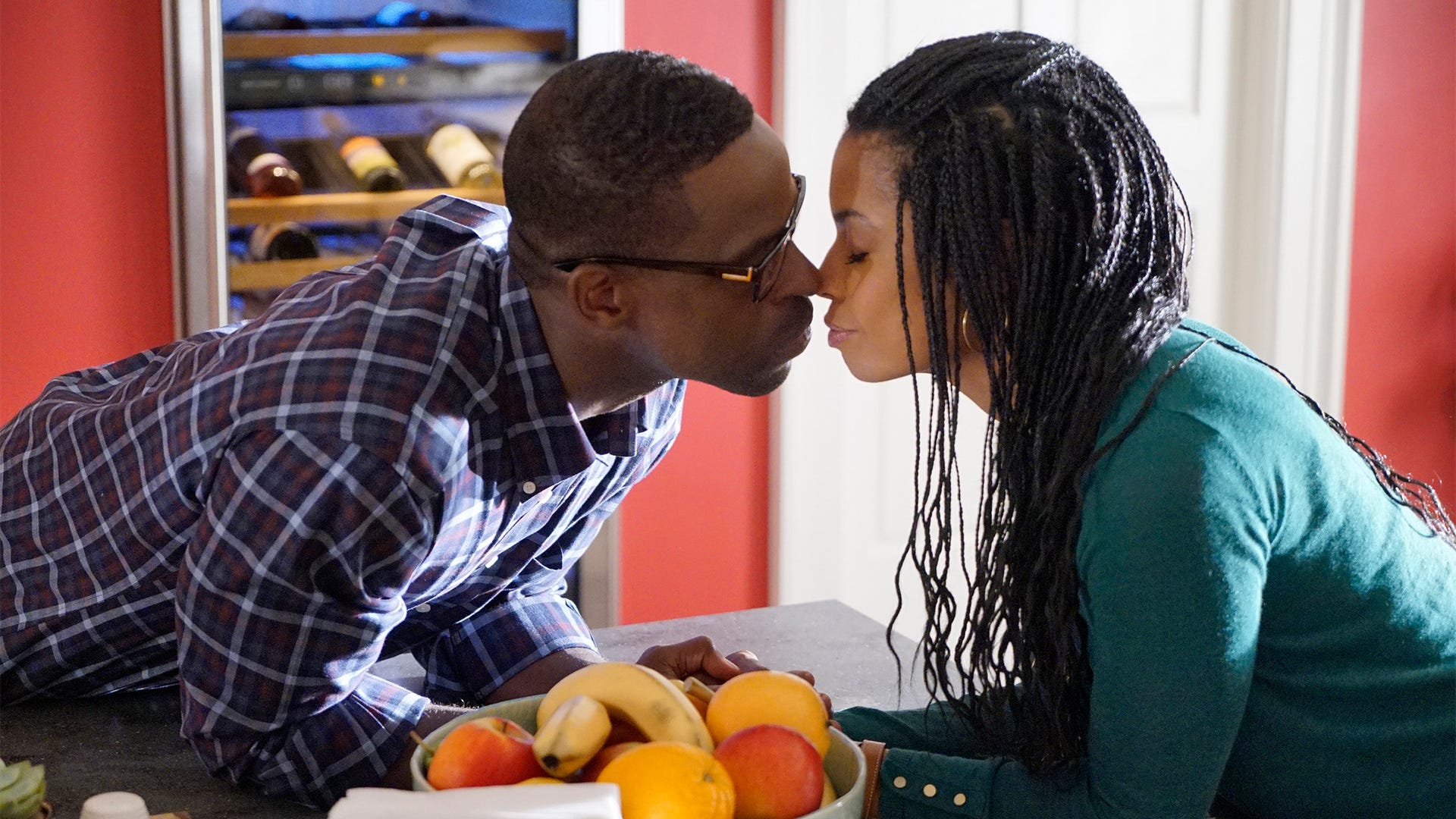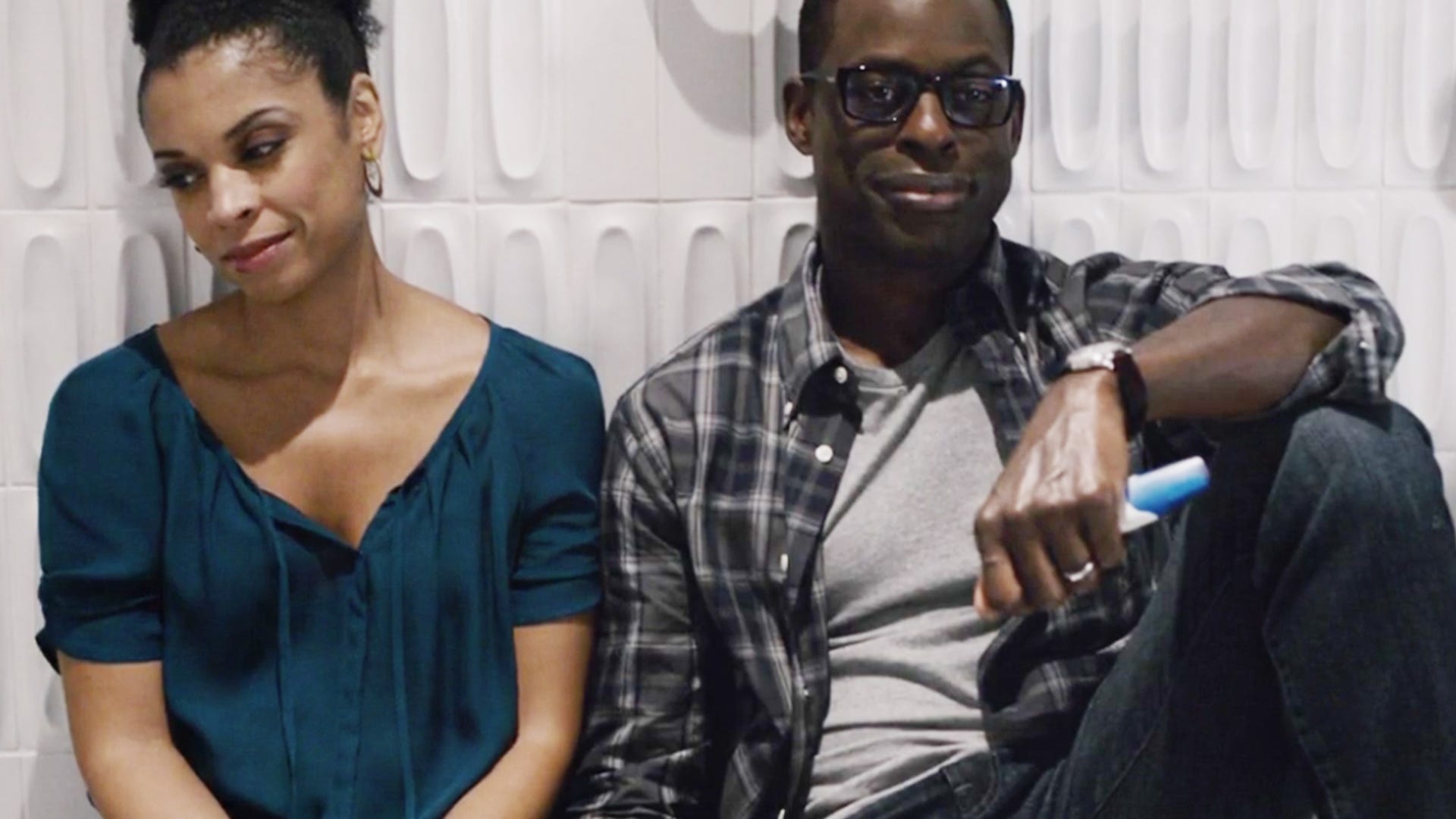Join or Sign In
Sign in to customize your TV listings
By joining TV Guide, you agree to our Terms of Use and acknowledge the data practices in our Privacy Policy.
This Is Us' Randall and Beth Are an Unprecedented Coup for TV
TV's most lovable couple is more than just adorable
On This Is Us, Randall Pearson (Sterling K. Brown) is and has always been 100 percent black. That is to say, Sterling K. Brown's presence in the series is not the result of colorblind casting, but because the narrative follows a black boy who grew up to be a black man with a black wife, black daughters and the ability to code-switch in the presence of his own (white) family.
But while Season 1 made Randall's internal life just a small portion of the Pearson clan's drama, Season 2 has dialed up its exploration of his identity -- particularly so in Episode 4 ("Still There"). This season, This Is Us has deepened its portrayal of Afro-American family life, making it not only the only primetime network drama to do so but also the only show to prominently feature said Afro-American family on show whose main cast is mostly white and appeals to a mostly white audience. Randall and Beth (Susan Kelechi Watson) are a daring, watershed moment for TV and for culture, and they're also a much needed Trojan horse in 2017. Because of them, millions of (mostly white) Americans now see an intimate portrait of a black family they might not have otherwise. It's exceedingly rare for majority-black shows to catch on with white audiences but, within This Is Us, Americans have welcomed Randall and his family into their homes and hearts, just like Jack (Milo Ventimiglia) and Rebecca (Mandy Moore).

Sterling K. Brown, Susan Kelechi Watson, This Is Us
NBCPundits love calling our nation deeply divided, but almost all Americans agree that Afro-American culture influences mainstream culture. A whopping 73 percent of non-Hispanic whites believe that, according to a 2017 Nielsen report, and that sentiment is hardly news to anyone who can identify Beyoncé or Oprah. Despite that fact, Americans are, for the most part, segregated by what they watch. Dramas dominated by majority black casts just don't exist on primetime, and those on other networks, like STARZ's drama Power or BET's Being Mary Jane, are, by design, watched by mostly black audiences. Conversely, Afro-Americans make up a little over 11 percent of This Is Us' viewership; This Is Us' audience is 89 percent non Afro-American. This Is Us doesn't even rank in Afro-Americans' top five shows. So while white audiences might not be watching Queen Sugar to see the Bordelons trying to mend their broken family, they are seeing a black man struggle with crippling anxiety on This Is Us and forming a personal connection with him in an opportunity they've likely not sought out before.
This Is Us' Susan Kelechi Watson Explains How Randall and Beth Feel So Real
Of course, plenty of Afro-American families have been watched -- and loved by all -- on primetime shows before now. But, with the exception of campy soap Empire, almost every one is a comedy. From Julia to Good Times to The Jeffersons, My Wife and Kids to Everybody Hates Chris and The Carmichael Show, stories about black family life have almost always been shrouded in jokes, as if characters were required to entertain, make themselves palatable and soften any harsh truths before tiptoeing out after 22 minutes. Susan Kelechi Watson told TV Guide that one of her key inspirations for Beth was Gina (Tisha Campbell-Martin) on Martin, a telling acknowledgment of how few dramatic inspirations she could find.
Drama, on the other hand, raises the emotional stakes. Drama demands a higher investment, and forces people to build empathy. This Is Us wades into the complexities of blackness; it makes viewers see that being a black man -- even a palatable, successful one -- means feeling occasional bouts of crippling anxiety or mild paranoia in your own car in your own neighborhood. Randall embodies how, at birth, black people inherit ancestral and/or parental trauma and then spend the rest of their lives forever juggling identities. Randall makes people see what living in two worlds looks like: he's an American and a black American; he's a Pearson and The Black Pearson. For a nation that just can't seem to understand why footballers want to kneel -- after multiple black people were killed by police without consequence -- Randall and Beth may be, for many, the first giant step towards understanding and compassion that could one day make a light bulb go off.

Susan Kelechi Watson, Sterling K. Brown, This Is Us
NBCThis Is Us: 7 Times Randall and Beth Gave Us Relationship Goals
This Is Us may not have set out to humanize black families or make white people understand the effects of racism. He and his family are simply part of a story about one American family (a realistic story at that, considering 73 percent of non-Caucasian children adopted are in white families according to advocacy group Rainbow Kids) that has to address race sometimes, just like any other family has to address finances or health or sexuality. Writers have drawn Randall as a believable, nuanced and flawed human being, not a construct, but he's still a powerful tool, as proven in the recent thrilling confrontation between Rebecca and her mother.
Rebecca's mom has always been a pain in the ass, but watching her give young Randall a basketball (as if all black boys play b-ball, and anyway, Randall likes math, science and football) and then poo-poo his career aspirations was a 3D, IMAX-size immersion into what racism feels like: paralyzing, cold, venomous, and often exercised by people who claim to like you. Rebecca finally confronts her mother's bigotry head on, calling her mom a racist and demanding she leave -- the only right thing to do here. Randall, sadly, witnessed the whole exchange but gets his comeuppance later, when his humbled grandmother seems to finally see Randall as a person and not a box of stereotypes she's collected over the years. She tells him he's a good kid. "Took you long enough," he says, quite possibly speaking for many more people than himself.
This Is Us continues Tuesdays at 9/8c on NBC.
